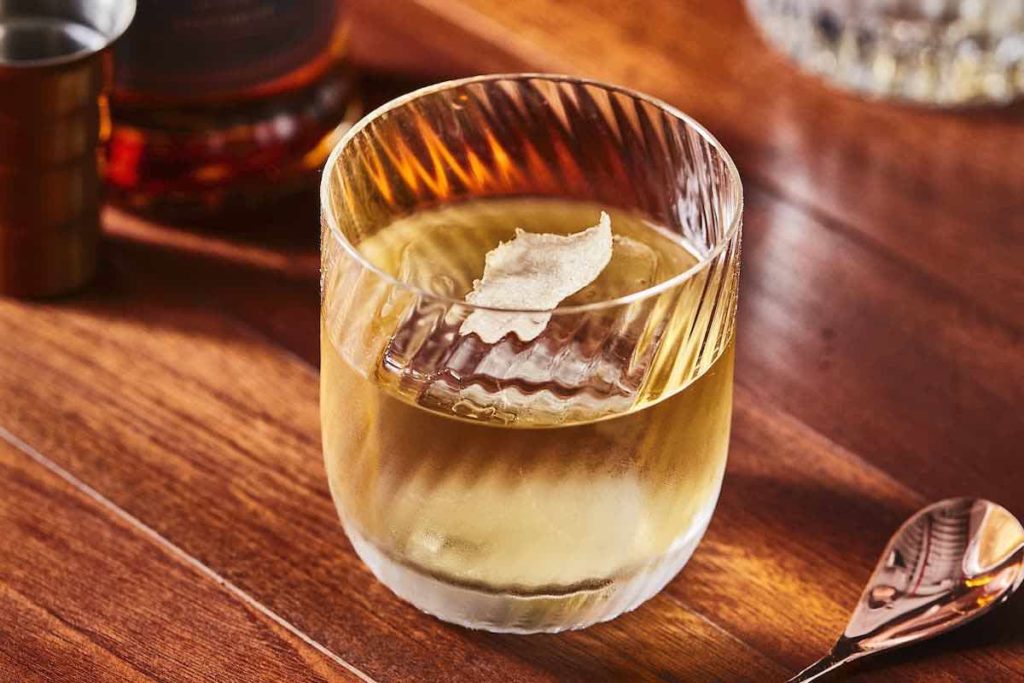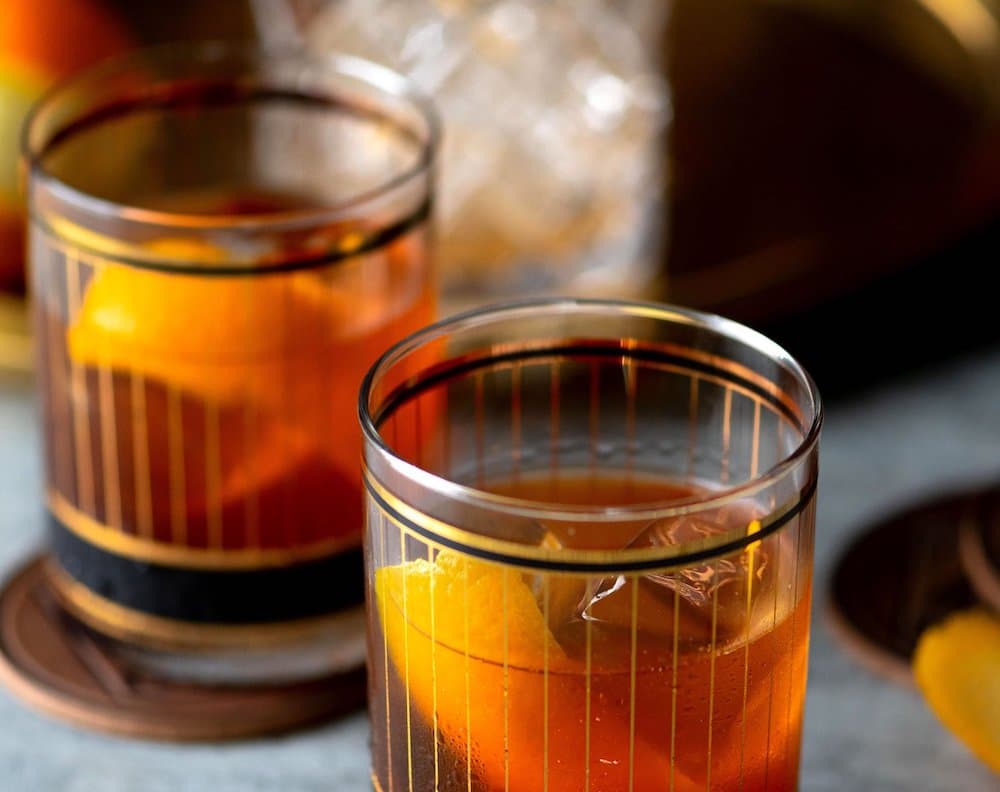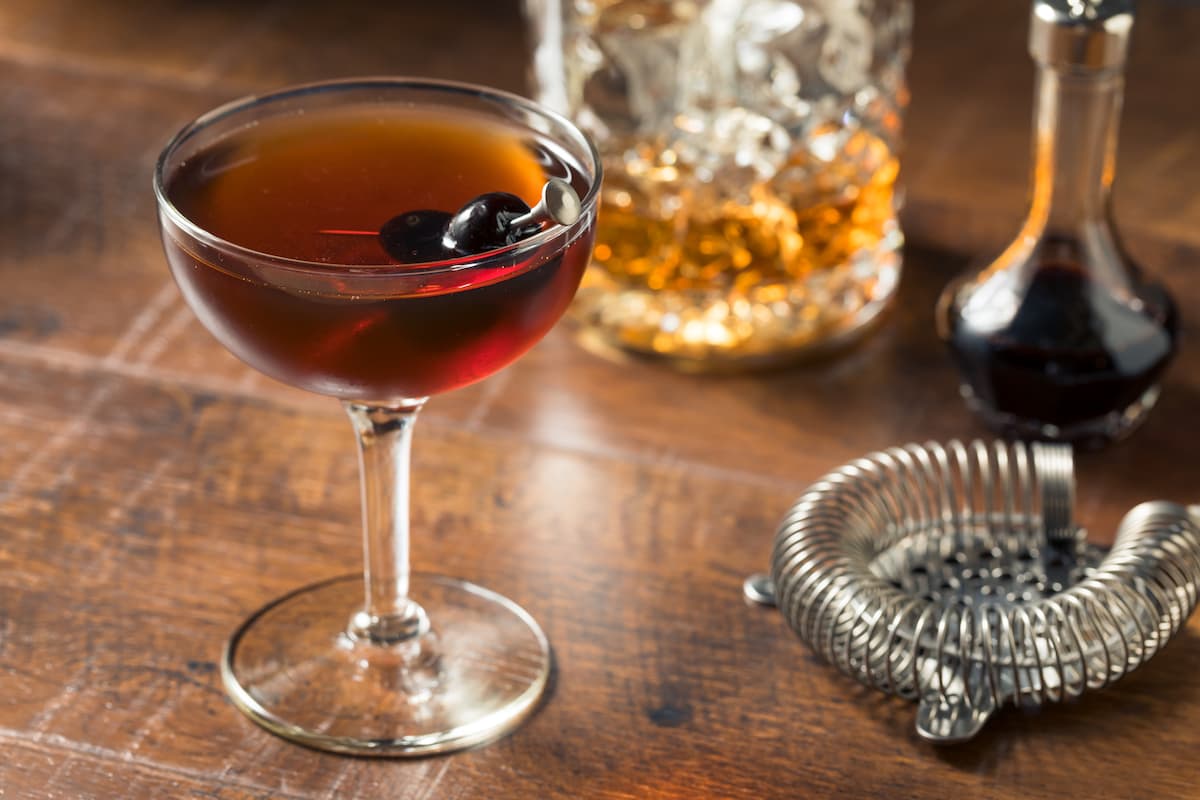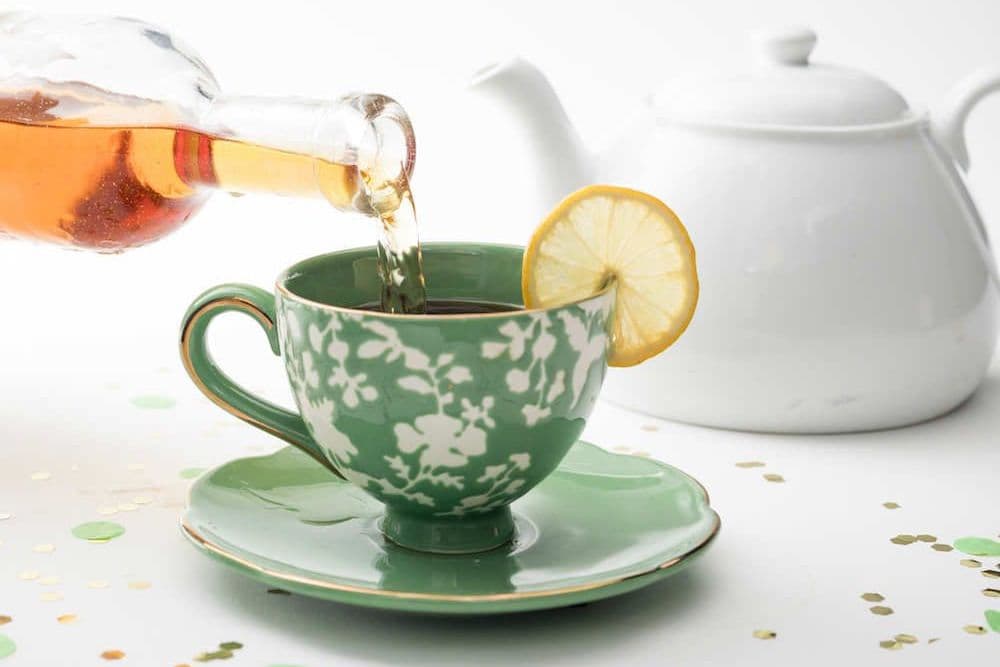Fat washing is the process of infusing alcohol with fatty flavors, often from meat. It is the technique used to put the smoked bacon flavor into drinks like the famous Benton’s Old Fashioned, created by Don Lee at PDT. The method is pretty simple: infuse fat into alcohol for a few hours, then freeze the mixture so that the fat freezes solid and rises to the surface. The solids can then be strained off, leaving the liquid to retain the fatty flavors and a new silky texture.
The fat washing technique has been used on a number of different meats: high-end Chinese restaurants have been infusing Peking duck fat into cocktails, while some steakhouses are doing Wagyu-washed drinks. Bartenders also moved into butter-washing with ghee, browned butter, and even cream cheese.
What works for fat also works for oil. Some of the first oil washes that I saw used were of olive oil-washed gin that was subsequently used in a Martini. In the years since then, bartenders have picked up coconut, sesame, truffle, peanut, and other oils to try.
Brian Petro of Smart Guy in a Tie Cocktails, says, “Oil mixes with water about as well as it mixes with alcohol. Oil is nonpolar and water is polar, meaning the two will never mesh well together. Adding oil to a cocktail without the aid of science will just add a sheet of oil to the top of a drink. It is not an appealing look.”
Most bartenders are oil-washing spirits in large quantities, but Petro adjusted the size of his batches for the home bartender. He recommends 0.5 ounces (15 mL) of oil for every 8.5 ounces (250 mL) of alcohol. This mixture should be shaken well, and allowed to infuse for 4-5 hours, shaking periodically. Place in the freezer for 2-3 hours (most bartenders leave theirs overnight) before straining out the now-solidified oil through cheesecloth or a coffee filter. Store any oil- or fat-washed liquids in clean, closed containers, ideally in the refrigerator if they won’t be used immediately.
Sebastian Reaburn, Distiller and Co-Owner at Anther Spirits says, “I have done a Manhattan with coconut fat wash, but used the coconut fat that is solid at room temp. I heated the fat, approximately 100 grams, then added one bottle of sweet vermouth while hot. allowed to cool, sieved out the solids, popped it in the fridge, then filtered with a coffee filter. The Manhattan was sensational.”

Heating up the fatty substance will help it infuse into the alcohol, but Jean Garcia of Haberdasher in San Jose took the trick further. She says, “So of course as you know, typically with fat washing, you heat up your fat/butter and then add the spirit to it and have it sit in the freezer to infuse. But there’s a little secret that bar folks wouldn’t normally think of doing because it sounds criminal: heating up the spirit with the oil. I know, it seems a little scary but turns out I’ve found that this draws out the most flavor in fat/oil washing.”
She continues, “Essentially, we take a big pot, add the shochu and 2 ounces of toasted sesame oil to every 750 mL bottle. We heat all of it up on the absolute lowest heat possible and cover it. It’s important that it’s the lowest setting and covered as we don’t want to lose or burn off any alcohol while infusing. We check on it periodically because as soon as steam appears, we immediately pull it off the heat, transfer it to a Cambro where it goes directly into the freezer for 24 hours. [Then] we strain it through a large coffee filter, and you have something truly unique and potent in flavor!”
In fact, Garcia was able to pull so much flavor out of the sesame oil that she needed to use the sesame-washed shochu as a modifier rather than as a base spirit in her cocktail called the Sunomono. In collaboration with a fellow bartender, she used the ingredient in a variation of the White Linen (gin, St. Germain, cucumber, sugar, lemon, soda water) with the sesame-washed shochu taking the place of St. Germain. She also noted that “fat washing with any fat/oil adds a delightful viscosity and flavor to spirits- without adding sugar.”
It wasn’t her first time using the technique. She says, “I have definitely tried fat washing with other oils. I originally tried this recipe years ago when every bar had some type of coconut washed whiskey cocktail on their menu. I’ve personally found that coconut oil has such a delicate and subtle flavor though—it’s hard to tell if it’s even there. I did try an olive oil washed gin and that’s amazing as well. In a Ramos Gin Fizz, it’s like drizzling olive oil on vanilla bean ice cream—rich and freaking delicious.”
At the bar Dalva in San Francisco, Eric Ochoa and Zakk Najera also used sesame oil in a cocktail, but rather than infuse the base spirit for the cocktail they planned, they infused maraschino liqueur with it. Ochoa said that he made that decision because they needed less of the liqueur in the drink and thus could store it in a smaller bottle on the bar top, rather than having to keep it in the bar’s well where space is precious.

Brian Evans, Director of Bars for Sunday Hospitality Group in NYC (Sunday In Brooklyn, Hotel Chelsea, Rule of Thirds) took things to an even more micro level. He uses the oil washing technique to create tinctures in neutral spirits that can be added cocktails. His recipe is to combine 300 grams of sesame or white truffle oil with 600 grams of neutral high-proof spirit like Everclear, then stir and allow it to infuse for 24 hours at room temperature. He then freezes the liquid overnight and strains it through a coffee filter. (He also notes that this can be done more quickly with a sous vide infusion at 150 F for two hours before freezing.)
Evans notes that this works well for aromatic oils like sesame and truffle oil, but it probably would not be effective for other oils. He says, “What started out as a strategy to reduce prep amidst reopening our restaurants with limited staff, turned into an easier way to control the volume of intense, fat-based flavors in cocktails. Just 2-3 dashes of sesame or truffle oil tincture can transform any stirred or shaken cocktail with added layers, without the actual oil floating on the surface.”
Andreas Sanidiotis of Lost + Found Drinkery in Cyprus noted that the oil-washing technique can also be used as a medium to infuse delicate fresh herb flavors into a drink. Have you ever had a cocktail with a mint or basil infusion that tasted wilted or cooked? This technique is a clever way to avoid that.
Infuse mint, basil, cilantro, parsley, or other fresh herb into an oil, and then oil-wash a spirit with the flavored oil. “Because the herb will not come in direct contact with the alcohol, it won’t ‘burn,’” says Sanidiotis.
This reminded me of a drink made with this technique that I tried years ago at Bar Amano in Berlin. There, bartenders made a mint-infused butter, and then butter-washed the bourbon to use in a Mint Julep.
Sanidiotis offered a few other pro tips for oil washing. “The best way to filter, in my experience, is freeze overnight, and the oil will become solid. Filter once through a fine strainer and then filter again with a coffee filter. Filter it either in the fridge or in the freezer so the oil doesn’t start to melt [as you do it].”
Hopefully these tips should give you some inspiration on getting started or continuing with your oil washing journey. May your future be filled with Coconut Negronis, Silky Basil Gimlets, and Sesame Oil Old Fashioneds.



